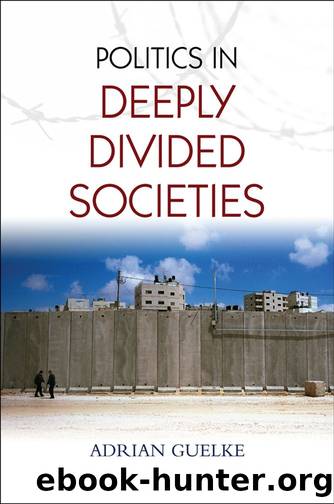Politics in Deeply Divided Societies by Adrian Guelke

Author:Adrian Guelke [Guelke, Adrian]
Language: eng
Format: epub
Publisher: Wiley
Published: 2013-04-25T23:00:00+00:00
Non-Racialism
But, leaving aside the progress of racial integration in the United States, there is in any event another case that might be used to demonstrate the viability of integration as a strategy for transforming a deeply divided society, and that is South Africa’s transition from apartheid to a non-racial democracy. Throughout the Cold War South Africa was a byword for racism, and after the decolonisation of the European empires and desegregation in the United States apartheid seemed an anachronism. However, there seemed very little prospect that the white minority would voluntarily give up power. There were concerns from an early date that the demise of apartheid would be accompanied by a racial bloodbath, particularly if whites believed that the only alternative to apartheid was (African) majority rule. In the light of the argument that deeply divided societies required special forms of governance, it was a short step to contending that South Africa, as a deeply divided society, was a prime case for the adoption of power-sharing or consociational alternatives to majoritarianism. But there was a powerful counter-argument. This was that the effect of special provisions for minorities in the political realm would be to entrench the socio-economic inequalities along racial lines that had developed under apartheid. And there was the implication that such a system would lack legitimacy and consequently perpetuate political instability.
When President de Klerk launched South Africa’s transition in February 1990 by releasing Nelson Mandela from jail and lifting the ban on the African National Congress (ANC), this amounted to an acknowledgement not just that apartheid had failed but that putting a new system into place would require negotiations with a range of political organisations, including the ANC. But it was President de Klerk’s intention that group rights would be a fundamental feature of any new dispensation his party agreed to in the course of negotiations. The National Party’s objective was that power-sharing among the parties would form part of the constitution of the new South Africa. But, because that would have entrenched white privileges, it was opposed by the ANC. National Party negotiators were well versed in the literature on consociationalism that underscored the need for special mechanisms to protect minorities in deeply divided societies, so were well equipped to make that case. However, they were unable to secure international support for their argument, with the American government in particular making clear its unwillingness to support the principle that group rights should be constitutionally protected.
The conflict between the government and the ANC over the issue led to an impasse in the negotiations in May 1992. At the same time, the high level of political violence compounded fears that the situation could spiral out of control (as shown in Table 4.3 in Chapter 4). The government had initially hoped that the violence would weaken the position of the ANC, but it became evident during the course of 1992 that it was having an adverse effect on support for the National Party. The government then gave ground, giving priority to achieving an agreement with the ANC.
Download
This site does not store any files on its server. We only index and link to content provided by other sites. Please contact the content providers to delete copyright contents if any and email us, we'll remove relevant links or contents immediately.
The Secret History by Donna Tartt(16606)
The Social Justice Warrior Handbook by Lisa De Pasquale(11485)
Thirteen Reasons Why by Jay Asher(7780)
This Is How You Lose Her by Junot Diaz(5753)
Weapons of Math Destruction by Cathy O'Neil(5029)
Zero to One by Peter Thiel(4816)
The Myth of the Strong Leader by Archie Brown(4785)
Promise Me, Dad by Joe Biden(4440)
Stone's Rules by Roger Stone(4412)
Beartown by Fredrik Backman(4403)
How Democracies Die by Steven Levitsky & Daniel Ziblatt(4392)
The Fire Next Time by James Baldwin(4336)
100 Deadly Skills by Clint Emerson(4070)
A Higher Loyalty: Truth, Lies, and Leadership by James Comey(4024)
Rise and Kill First by Ronen Bergman(4008)
The David Icke Guide to the Global Conspiracy (and how to end it) by David Icke(3875)
The Farm by Tom Rob Smith(3869)
Secrecy World by Jake Bernstein(3773)
The Doomsday Machine by Daniel Ellsberg(3725)
